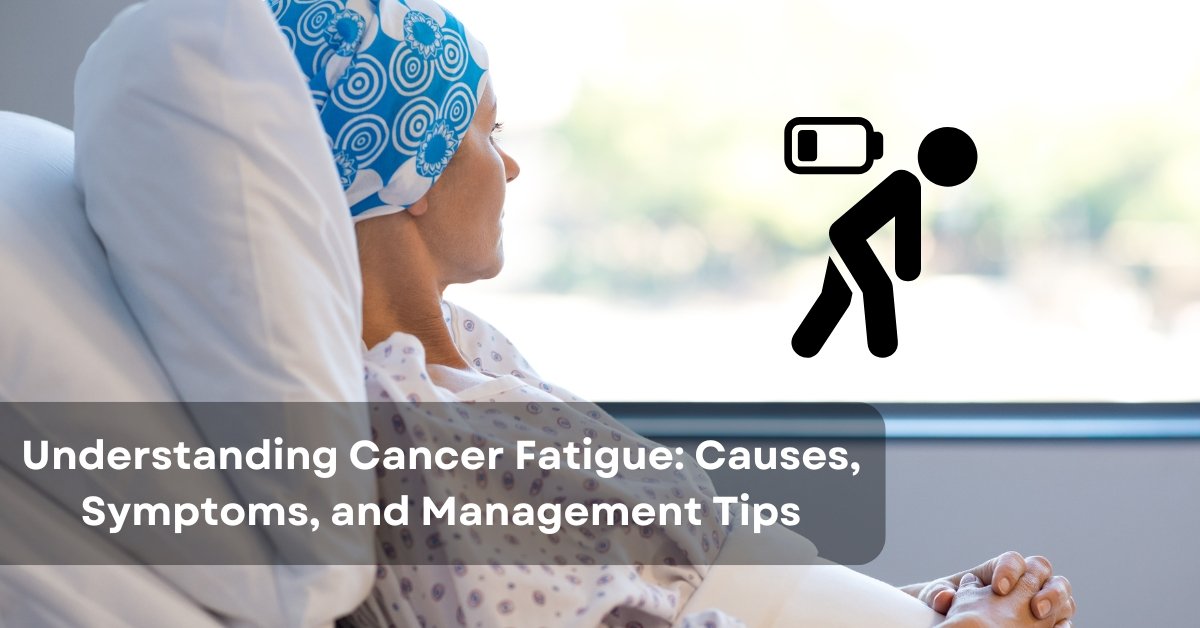
Cancer fatigue is one of the most common and challenging symptoms experienced by cancer patients. Unlike ordinary tiredness, this form of fatigue is pervasive, often unrelenting, and not entirely relieved by rest. Understanding and managing this condition can significantly improve the quality of life for patients undergoing treatment or in recovery.
What is Cancer Fatigue?
Cancer fatigue is defined as a persistent sense of tiredness or exhaustion related to cancer or its treatment. It is different from the usual fatigue people experience after physical or mental exertion. Cancer fatigue can occur suddenly, without warning, and is not always proportional to recent activities. It can last for weeks, months, or even years after treatment ends.
Causes of Cancer Fatigue
The causes of cancer fatigue are multifaceted and may vary from patient to patient. Some of the key contributors include:
- Cancer Treatment:
- Chemotherapy, radiation therapy, and immunotherapy can damage healthy cells alongside cancer cells. The body’s repair mechanisms require energy, leading to fatigue.
- Side effects like nausea, vomiting, and pain can further drain energy levels.
- Anemia:
- A common side effect of cancer treatments, anemia reduces the number of red blood cells, which are responsible for carrying oxygen throughout the body. Less oxygen means lower energy levels.
- Nutritional Deficiencies:
- Loss of appetite, taste changes, and gastrointestinal issues can lead to inadequate nutrient intake, exacerbating fatigue.
- Emotional Stress:
- A cancer diagnosis often brings anxiety, depression, and emotional stress, which can sap energy and motivation.
- Sleep Disturbances:
- Insomnia, restless sleep, or excessive sleep due to treatment side effects can contribute to daytime fatigue.
- Inflammation:
- Cancer and its treatment can trigger inflammatory responses, which have been linked to fatigue.
Symptoms of Cancer Fatigue
Patients experiencing cancer fatigue may report:
- A constant feeling of exhaustion that doesn’t improve with rest.
- Difficulty concentrating or thinking clearly (often called “chemo brain”).
- Reduced physical strength or stamina.
- Lack of motivation to engage in everyday activities.
- Emotional symptoms like irritability or a sense of overwhelm.
How to Manage Cancer Fatigue
While cancer fatigue can be overwhelming, there are ways to manage and alleviate its impact. Here are practical tips:
1. Energy Conservation
- Prioritize tasks and focus on what’s most important each day.
- Delegate responsibilities to friends or family members.
- Use tools like planners to schedule activities during times of peak energy.
2. Physical Activity
- Engage in light exercises such as walking, yoga, or stretching. These activities can help boost energy levels over time.
- Start slow and listen to your body. Overexertion can worsen fatigue.
3. Nutrition
- Work with a dietitian to ensure balanced meals rich in protein, iron, and vitamins.
- Stay hydrated and consume small, frequent meals to maintain energy.
4. Sleep Hygiene
- Establish a regular sleep schedule to regulate your body’s internal clock.
- Create a calming bedtime routine and ensure your sleeping environment is comfortable.
- Avoid caffeine and electronics before bed.
5. Mental Health Support
- Seek counseling or join support groups to address emotional stress.
- Practice relaxation techniques like meditation or deep breathing to reduce anxiety and improve focus.
6. Medication and Medical Interventions
- If anemia or hormonal imbalances are contributing to fatigue, your doctor may prescribe medications or recommend supplements.
- Report any severe or persistent symptoms to your healthcare provider for further evaluation and treatment.
When to Seek Help
While fatigue is common during cancer treatment, it’s essential to recognize when it may indicate a more serious issue. Contact your doctor if:
- Fatigue suddenly worsens or interferes with daily life.
- You experience unexplained weight loss, fever, or other symptoms alongside fatigue.
- Your fatigue does not improve despite following management strategies.
Dr. Saadvik Raghuram: Your Trusted Oncologist in Hyderabad
Dr. Saadvik Raghuram, a distinguished medical oncologist based in Hyderabad, is dedicated to helping patients navigate the challenges of cancer and its treatment, including addressing symptoms like cancer fatigue. By understanding the complexities of this condition, Dr. Raghuram empowers his patients with strategies to regain energy and enhance their quality of life.
Conclusion
Cancer fatigue is a complex and multifaceted challenge that requires a comprehensive approach to manage. By understanding its causes, recognizing its symptoms, and adopting practical strategies, patients can take steps to improve their quality of life. Always consult with your healthcare provider to tailor a management plan to your specific needs.
FAQs About Cancer Fatigue
Q1: Is cancer fatigue the same as regular tiredness?
A1: No, cancer fatigue is more severe and persistent than regular tiredness. It often doesn’t improve with rest and can significantly impact daily life.
Q2: Can cancer fatigue last after treatment ends?
A2: Yes, some patients experience fatigue for months or even years after completing treatment. However, its intensity usually decreases over time.
Q3: Are there medications to treat cancer fatigue?
A3: There isn’t a specific medication for cancer fatigue, but treatments for underlying causes, such as anemia or depression, can help alleviate symptoms.
Q4: How does exercise help with cancer fatigue?
A4: Regular, gentle exercise improves circulation, reduces inflammation, and boosts overall energy levels, making it an effective strategy for managing fatigue.
Q5: Should I push through cancer fatigue?
A5: It’s essential to listen to your body. While some activity is beneficial, overexertion can worsen fatigue. Balance rest and activity based on your energy levels.
Why More Young Adults Are Developing Colorectal, Pancreatic & Other GI Cancers …
By Dr. Saadvik Raghuram Y – Leading Oncologist in Hyderabad World Cancer …
Why Are So Many Young People Getting Cancer Today? Across the world, …
January is Cervical Cancer Awareness Month in India, and this article explains …
Cancer-Related Fatigue (CRF) is one of the most common—and most underestimated—symptoms experienced …
Every year, Aplastic Anemia Awareness Month shines a spotlight on a rare …

